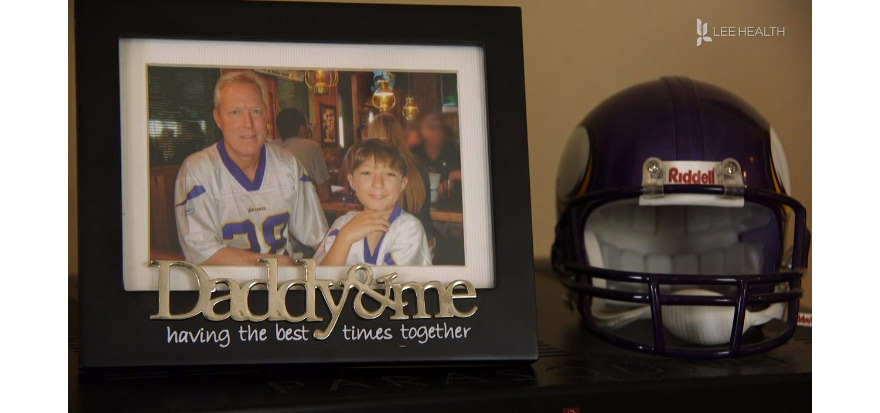Courtesy of Lee Health and WBBH.
Pete Jepson, 62, was no stranger to skin cancer. He had dealt with both basal cell carcinoma (BCC) and squamous cell carcinoma (SCC) several times before, and he visited his dermatologist in Naples, Florida, every few months for checkups. He was aware of what skin cancer could look like. When he noticed a small red bump below his sideburn, it didn’t look like skin cancer to him. He assumed it was just a cyst, similar to others he’d had that weren’t cause for concern. But when he pointed it out at his next dermatology appointment, his doctor removed the red bump and sent it to a lab for analysis.
“Five or six days later, I got a call,” Jepson says. “My doctor called me herself, not the office, so I knew something was fishy. She said the biopsy came back and it wasn’t basal cell, it wasn’t squamous cell and it wasn’t melanoma. So I asked, ‘What’s left on the list?’”
It was Merkel cell carcinoma (MCC), she told him, a rare and dangerous form of skin cancer. She explained that he would have to see a surgeon and have the tumor removed as soon as possible. Highly aggressive, and with a high risk of recurring and metastasizing, MCC kills about one in three patients. Melanoma, another form of skin cancer that is much more widely recognized as dangerous, kills about one in nine patients.
“I’ve been in the life insurance business for 30 years and I had never heard of it [MCC],” Jepson says. “It blew me away.”
Jepson did some research and found that his doctor was not exaggerating how serious the disease is. “I went into a cocoon for a week,” he recalls. “If you’ve been diagnosed with this, you’re just terrified that you’re not going to be around in a few years.”
Surgery Was Just the Start
Jepson had surgery right away. His physician removed the tumor with large margins, meaning he removed a wider area of skin around the tumor than is required for less dangerous types of skin cancer. The surgery left Jepson with a 10-inch scar on the side of his face. Unfortunately, this would be just the beginning of his treatment. His cancer had already begun to spread.

Courtesy of Lee Health and WBBH.
After learning his cancer had progressed, Jepson faced some difficult thoughts about the future. “I have a 17-year-old autistic son. If I die, how is my son is going to fend for himself? That was my biggest fear,” he says. “Part of living with Merkel cell is that you don’t have a lot of options. I bought millions of dollars in life insurance. You have to get your insurance in order, because God forbid if something happens to you and you didn’t.”
The cancer’s advancement called for additional treatment, which in Jepson’s case meant radiation. Twenty-five rounds of it, to be exact. Jepson went in for treatment every day for 22 business days, then had to stop for a two-week break after suffering burns on his neck. After finishing his final three rounds of radiation, Jepson also had to have ear tubes inserted — an attempt to rectify the hearing loss he experienced as a side effect of the treatment.
“The treatments just tore me apart,” Jepson says. “I was nauseous and tired. I was affected at work and would just come home and sleep.”
Finally, Some Good News
Jepson would never want to repeat the experience, but his treatments eventually paid off. A few weeks after his radiation was finished, Jepson, a Minneapolis native, traveled to Minnesota to see the Vikings play the Green Bay Packers. Unfortunately, he had accidentally purchased phony tickets online and was denied entry to the stadium. Disappointed, he headed to the airport to fly back to Florida, when he received a call from his surgeon.
“I had gotten a PET scan before I went to Minnesota, and of course I wanted to know the results,” Jepson says. “But with what happened with the game, I was just expecting more bad news.” His doctor had good news, though: Jepson was cancer free.
“I just started crying in the TSA security line,” he says. “All of a sudden the game meant nothing — because this was my life.”
From Fear and Doubt to Support and Hope
Throughout his journey with Merkel cell carcinoma, Jepson certainly experienced moments of fear and doubt. But he met people along the way that kept him going as well. After telling one of his clients about his diagnosis, the man shared that he, too, had been diagnosed with MCC. The only other person Jepson had met who had the disease, this man was 87 years old and still alive three years after his diagnosis.
The technician who performed Jepson’s last PET scan, Addy, also had a bit of insight to share. “She told me I looked nervous, and she asked if she could tell me a story that would give me hope,” Jepson says. “Turns out, she had her left breast removed at 19. She was pregnant at the time. She went on to have two more kids, and she had only just gotten her hair back after six years of radiation and chemo. That convinced me I didn’t have it so bad.”
Jepson returned to the radiology center with a dozen roses for Addy, which she accepted tearfully. “When you get MCC, you learn how to treat other people and show respect,” Jepson says. “You learn to live every day like it’s your last day.”
Jepson is now six months cancer free. His experience with MCC is never far from his mind, though. Jepson says he still thinks about his diagnosis every day, and is planning to write a book, set up a fund for MCC patients to offset medical costs and raise awareness any way he can. He also has some advice to share with others like him. “Know how serious it is,” he says. “Get the treatment, get the surgery, the radiation, whatever they tell you. Then fight with all you’ve got.”
This post is part of a patient education series made possible through a grant from EMD Serono and Pfizer. Learn more at EMDSerono.com.





